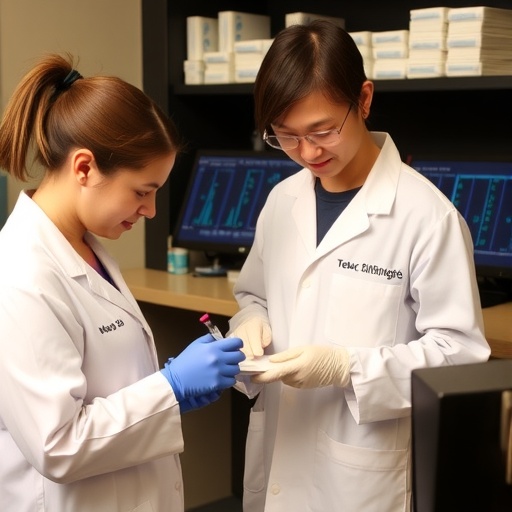In a transformative leap for genetic testing and precision medicine, researchers at Texas Children’s Neurological Research Institute (NRI) in collaboration with Baylor College of Medicine have unveiled an innovative methodology that significantly enhances the resolution and accuracy of genetic variant interpretation. Published in the esteemed journal Nature Communications, this research introduces a sophisticated approach to deciphering allele frequencies within admixed populations by incorporating local ancestry inference (LAI) into the Genome Aggregation Database (gnomAD), a critical resource widely used in clinical genomics and genetic research.
Traditional genetic testing methodologies have relied heavily on the aggregation of allele frequencies across broad population groups to estimate the likelihood that a given variant is pathogenic or benign. However, this approach often falls short when applied to individuals of mixed genetic heritage, where the amalgamation of alleles from diverse continental ancestries—such as African, European, and Indigenous American lineages—can obscure important genetic signals. Admixed populations, including African/African American and Latino/Admixed American groups, embody a complex mosaic of ancestral contributions, rendering conventional frequency estimates insufficient for precise clinical interpretation.
The breakthrough by Dr. Elizabeth Atkinson and her team addresses this gap by leveraging local ancestry inference, a computational technique that segments an individual’s genome based on ancestral origin at a granular, locus-specific level. Unlike global ancestry assignments, which broadly categorize individuals, LAI dissects the genome into ancestry-specific tracts, allowing the researchers to calculate allele frequencies within these discrete segments. This refined resolution exposes genetic variants that are inconspicuous or misclassified under traditional methods but reveal distinct frequency patterns when viewed through ancestry-resolved lenses.
Clinical applications of this advancement are profound. The research uncovered that over 80% of genetic loci in African/African American and Latino/Admixed American populations exhibited variant frequencies higher in particular ancestry tracts than previously recognized under aggregated data paradigms. This reclassification is not merely academic; it impacts variant pathogenicity annotations crucial for clinical decision-making. Certain variants previously regarded as rare—and therefore potentially pathogenic—may cross benign frequency thresholds when analyzed against local ancestry backgrounds, mitigating risks of misdiagnosis and inappropriate clinical intervention.
By embedding local ancestry-informed allele frequencies into gnomAD, the team has empowered clinicians, genetic counselors, and laboratories with a more nuanced interpretive framework. This database enhancement facilitates the recalibration of variant classification, particularly benefiting patients from admixed populations who have historically been underserved by one-size-fits-all genomic resources. The implications extend towards reducing health disparities, improving diagnostic precision, and tailoring patient care grounded in the genetic complexities of ancestry.
The research underscores a paradigm shift in genomics: moving beyond simplistic racial or ethnic labels to embrace the intricate tapestry of human genetic diversity. Dr. Atkinson remarks on the limitations of broad demographic labels in clinical genomics, emphasizing the necessity for ancestry-specific insight to prevent erroneous genetic conclusions. This nuanced perspective aligns with a growing movement in personalized medicine aimed at precision and inclusivity.
Technically, the study’s implementation involved sophisticated statistical modeling and high-resolution genome analysis, integrating large-scale population genomics data from gnomAD with advanced computational pipelines for LAI. The outcome is a robust, publicly available resource that sets new standards for genetic variant interpretation in admixed populations—a historically challenging domain due to admixture complexity and underrepresentation in genetic databases.
The publication in Nature Communications reflects the broader scientific community’s recognition of the work’s significance. It navigates the intricate intersection of computational genetics, epidemiology, and clinical genomics—a convergence that propels the field towards more equitable and scientifically rigorous genomic medicine. Co-first authors Pragati Kore and Michael Wilson played instrumental roles in the technical development and validation of this approach, contributing to its groundbreaking nature.
Implementing local ancestry inference within gnomAD also provides a template for future developments in genetic databases globally. As genomic data accrues from increasingly diverse populations, the incorporation of ancestry-specific analytic frameworks will be essential to maintain clinical relevance and accuracy. This research therefore not only addresses current challenges but anticipates the evolving landscape of global population genomics.
The clinical community stands to gain considerably from these advancements, as genetic diagnoses inform a myriad of healthcare decisions, from disease predisposition to pharmacogenomics. Enhanced allele frequency accuracy reduces the ambiguity that often confronts genetic counselors when evaluating variants of uncertain significance, especially in admixed individuals who have historically faced diagnostic ambiguities due to the limitations of existing databases.
Texas Children’s Hospital continues its legacy of pioneering research and patient-centered innovation with this development. Affiliated with Baylor College of Medicine, the institution’s commitment to integrating cutting-edge genomic science into clinical care is exemplified by this work. The research signifies a milestone in the journey toward truly personalized genetic medicine, reflecting both scientific ingenuity and a dedication to addressing health disparities at the genomic level.
Through this advancement, the scientific and medical community is equipped with a transformative tool that harmonizes genetic diversity with diagnostic precision. The embedding of local ancestry-informed allele frequency data into the gnomAD database is set to become a new gold standard, redefining genetic variant interpretation in the era of personalized medicine.
Subject of Research: Genetic Variant Interpretation in Admixed Populations Using Local Ancestry Inference
Article Title: Texas Children’s Researchers Create Groundbreaking Tool to Improve Accuracy of Genetic Testing
News Publication Date: October 6, 2025
Web References:
References:
- Atkinson, E. et al. Improved Allele Frequencies in gnomAD through Local Ancestry Inference. Nature Communications, 2025.
Image Credits: Texas Children’s Hospital
Keywords: Neuroscience, Clinical neuroscience, Genetic testing




